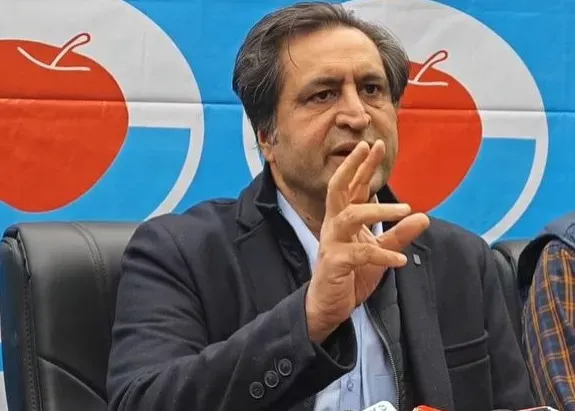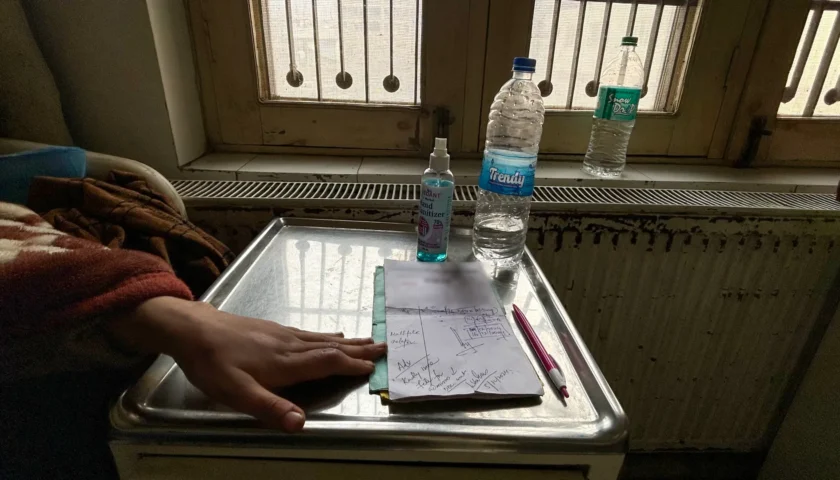Sajad Lone Accuses Govt of Inaction as Fruit Industry Suffers
By: Javid Amin | 15 September 2025
Peoples Conference president Sajad Gani Lone has unleashed sharp criticism against the Jammu and Kashmir administration, calling its handling of the Valley’s ongoing fruit industry crisis a case of “criminal inaction.”
The breakdown, triggered by the prolonged blockade of the Jammu–Srinagar National Highway (NH-44), has stranded thousands of apple-laden trucks for more than two weeks, resulting in massive losses and triggering protests across the Valley’s fruit belt.
Lone’s Attack on Govt Inaction
Taking to X (formerly Twitter), Lone wrote:
“Inclement weather is not the fault of the government. But sitting like a mute spectator and doing nothing is criminal.”
He accused the administration of failing to facilitate smooth passage for perishable goods, despite knowing the stakes. “This is not just about trucks and traffic—it’s about people’s livelihoods being crushed,” Lone said in a follow-up media interaction.
Lone reserved special criticism for Chief Minister Omar Abdullah, urging him to stop “wandering aimlessly across the country” and instead “sit with officers and stakeholders to devise a serious strategy.”
The Scale of the Crisis
Kashmir’s apple industry is the backbone of its horticulture sector, contributing nearly 8% to J&K’s GDP and supporting 3.5 million people.
But with trucks stranded in Ramban and Udhampur sectors due to landslides and highway collapses, apple consignments worth over ₹500 crore are reportedly rotting.
Mandis in Sopore, Shopian, Kulgam, and Anantnag—the lifelines of Kashmir’s horticulture economy—have shut down in protest, accusing the government of apathy.
Growers warn that unless a resolution is found within 48 hours, a valley-wide strike will be enforced.
Fruit Growers: “Our Year is Destroyed”
In Sopore mandi, Asia’s second-largest fruit market, the mood is one of despair. Abdul Rashid, a third-generation apple grower, says:
“We spend all year nurturing our orchards. Now, trucks are parked for 15 days on the highway. By the time they reach Delhi or Azadpur mandi, the apples are rotten. Who will pay for our losses?”
Another grower from Shopian added:
“It is not just apples—it is our children’s education, our bank loans, our family survival. This is a livelihood emergency.”
Political Stakes Rising
The crisis has quickly escalated into a political flashpoint. While Lone’s remarks sharpened the opposition’s attack, growers argue that the issue cuts across party lines.
Former CM Mehbooba Mufti also echoed concerns earlier this week, accusing the administration of “criminal neglect of the Valley’s only stable economy.”
Meanwhile, the Omar Abdullah-led government has maintained that restoration efforts are underway. Officials cited landslides and heavy rains as unavoidable natural challenges, but assured that “priority corridors for fruit trucks” are being worked out.
Why the Highway Matters So Much
The Srinagar–Jammu highway (NH-44) is Kashmir’s only all-weather road link to the rest of India.
-
90% of Kashmir’s apples travel through this route to reach mandis in Delhi, Chandigarh, and other cities.
-
Any disruption leads to immediate losses, as apples are perishable and storage facilities in the Valley are still limited.
-
The delay also disrupts export channels to the Middle East and South Asia, hurting Kashmir’s global footprint.
Experts argue that the lack of rail-based cold chain cargo and inadequate air freight options have made the Valley dangerously dependent on NH-44.
Long-Term Impact: More Than Just Apples
This year’s crisis has highlighted structural weaknesses:
-
Horticulture Loans: Thousands of growers have bank loans pending, and defaults are expected to rise.
-
Youth Disillusionment: Kashmir’s young horticulturists, who were encouraged to modernize orchards under government schemes, now feel abandoned.
-
Mandis at Risk: Prolonged shutdowns in Sopore and Shopian could trigger a cascading collapse of the trading ecosystem.
As one trader put it:
“If the government can’t guarantee road access during harvest season, what is the point of all their schemes? We are being left to fail.”
A Call for Immediate and Structural Action
Sajad Lone’s outburst reflects a growing consensus: Kashmir’s fruit economy cannot be left hostage to weather and road collapses.
Policy experts have long recommended:
-
Dedicated rail cargo trains for apples during harvest months.
-
Expansion of cold storage chains in Sopore, Shopian, and Pulwama.
-
Priority freight corridors for perishable trucks, with green channel passes.
-
Air freight subsidies during highway collapses.
Without these, crises like the current one will repeat year after year.
Bottom-Line: A Test of Governance
For Kashmir, apples are not just fruit—they are the lifeblood of its rural economy, the pride of its orchards, and a symbol of resilience.
The current highway blockade is more than a logistical setback; it is a litmus test of governance. The government’s ability—or failure—to safeguard this sector will decide not just the fate of this harvest, but the trust of millions who depend on it.
As Lone warned:
“The Valley doesn’t need spectators. It needs leaders who act.”



